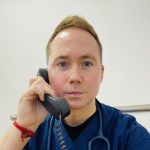
 Paul McNamara is a GP registrar in Glasgow and honorary clinical lecturer at the University of Glasgow. He has an interest in research and medical education. He is the author of two books; Case-based Discussions in Medicine, and Mastering Medical Exams.
Paul McNamara is a GP registrar in Glasgow and honorary clinical lecturer at the University of Glasgow. He has an interest in research and medical education. He is the author of two books; Case-based Discussions in Medicine, and Mastering Medical Exams.
Rumaisa Zubairi is a third year medical student at the University of Glasgow currently intercalating in inflammation medicine.
Frustrated. Exhausted. Burnt out. These are just some of the things our colleagues in primary care are feeling. I’m a GP registrar in the final 6 months of my training. It’s taken me 15 years to get to this stage after starting my medical education in 2006. Like my colleagues, it’s taken commitment, numerous exams, and countless sacrifices; but it has always been worth it knowing I was making a difference to my patients’ lives and the satisfaction their hard earned respect and gratitude gleaned. But all that has changed. The recent vitriol aimed at primary care from mainstream and social media is demoralising, soul destroying, and incredibly damaging.
Contrary to popular belief, we are and always have been open. Prior to entering GP training, I worked in secondary care as a medical and emergency medicine registrar. Like most of my hospital colleagues, I had little to no understanding or appreciation of what actually happened in the far off, mystical and distant land of general practice. I do now. Having been the most senior doctor covering medical wards and emergency departments out of hours in busy inner city hospitals, I can firmly say I have never been busier. The pressures are different, but the impact is real and it’s palpable.
The recent vitriol aimed at primary care from mainstream and social media is demoralising, soul destroying, and incredibly damaging.
The pressures of the pandemic have brought countless challenges across the board. Staff have continued resiliently, all pistons going. At the coalface of care GPs have been affected in unique ways; re-cast as villains in a pandemic tale of triage, telephone appointments, and tabled hopes.
To keep our patients and staff safe, we did what the government advised and moved the bulk of our work to remote consultations. However, if a patients’ history necessitates a face-to-face appointment, my practice has always accommodated that. Today I saw a 60-year-old man with glioblastoma and told him that sadly his disease was progressing and he was now dying. His crying wife was also there, listening, as I described how I would support them as his illness took its natural course.
Today I also met a worried mum. I listened to her fears that her 1-year-old daughter was having unresponsive episodes and how, after talking to me, she felt relieved that her fears had been heard and acted on with a plan we made together.
Today I also met a 56-year-old man with new reflux symptoms and weight loss, a lady with decompensated liver disease, two patients with abdominal pain, one with rectal bleeding, and multiple patients with various constellations of symptoms of varying complexity that have undoubtedly been exacerbated by the toll of the pandemic.
I also spoke to many patients on the phone, carried out a house visit on a lady with end stage myeloma, and signed endless prescriptions. All before lunch (which I had at my desk). I know my colleagues up and down the country are having days just like this, trying their best, while the media paint us as lazy, money-grabbing, golf playing, work-shy villains. The pre-pandemic hero claps have been replaced by insults and slaps.
Social media attacks from a frustrated public are becoming increasingly vicious and while GPs look to their hospital colleagues for support, disappointingly many are joining in with the abuse.
The GP crisis
The pre-pandemic hero claps have been replaced by insults and slaps.
General practice was in crisis long before the pandemic. GPs routinely reported working over their contracted hours1 and the GP shortage of over 2500 full-time equivalent GP roles is on course to rise to 7000 unfilled roles in 2023,2 despite intense drives to recruit more trainees. GPs are responsible for 90% of patient consultations in the NHS and yet are only allocated less than 10% of NHS budgets.3
The GP crisis has been described as ‘as serious a problem as COVID’4 by Professor Dame Clare Gerada, former chair of the Council of the Royal College of General Practitioners (RCGP). The shortage has placed great strain on the profession. GPs are overworked, overburdened, and overstretched.
COVID-19 issues
COVID-19 has only exacerbated these issues. Health concerns are more common, and the number and complexity of cases has increased due to a combination of the postponement of non-essential care and later presentations due to patient anxieties around accessing health care during a pandemic. GPs have adapted remarkably to the new way of working. At this difficult time, GPs have advocated for their patients’ health, taking the time to address the concerns of vaccine hesitant patients and convince them that despite the misinformation, it is in their best interest to take the vaccine. Telephone triage has been adopted across the board and this has largely been both effective and efficient.5
However, the increased demand on GPs’ time has strained the profession. We carried out an informal survey of 244 GPs, advertised to GP groups on social media, investigating the impact of COVID-19. Eighty-seven per cent of responders felt that the pandemic had impacted ‘negatively’ or ‘very negatively’ on their practice.
Social media and damaged morale
Despite the best efforts of GPs to remain available in difficult circumstances, social media has reflected the frustrations of a growing number of patients. Patients have perceived locked doors as practices being closed for business. That could not be farther from the reality, as 92% of survey responders felt that their already heavy workload had increased as a result of the pandemic as GPs shoulder the burden of cancelled hospital appointments.
… four in five GPs have seen negative comments from other health professionals, those who are best placed to stand up for their colleagues as outsiders.
The toxic environment is ubiquitous on social media. Ninety-seven per cent of responders had seen negative comments from the public while 88% of responders had encountered abuse from their own patients in the past 6 months.
All responders, bar one, had seen negative press about primary care in the media including headlines such as ‘GPs are hiding’, ‘GPs are skimming money off the NHS to sit and do nothing’, and ‘remote consultations are killing people’. Anti-GP memes further the idea that GPs are ‘lazy’, ‘cowards’, and ‘have been hiding’. Most disappointedly, 86% of GPs have seen negative comments from other health professionals, those who are best placed to stand up for their colleagues as outsiders.
This has had a devastating effect on morale, with an overwhelming 99% reporting that negative press had a negative impact on morale. Without support from colleagues and governing bodies, GPs feel attempting to counter the narrative is futile. GPs are ‘exhausted’; the ideas of critics are ‘very deep rooted’ and replying would only ‘invite further abuse’. As a result, GPs feel ‘close to burnout’ and ‘dreading going back to work’. Only one responder felt that public perception of GPs during the pandemic would positively impact primary care.
This has created a precarious situation. In the face of a GP crisis, our survey showed that only 19% of GPs are satisfied with their job and only 35% would recommend general practice to future applicants. Unless things change for the better, the GP gap will only continue to grow.
Solutions and future
If we don’t support those working in primary care … the NHS as we know it will no longer exist.
We gathered suggestions from the GPs who answered our survey on how to improve the situation and boost morale. Sixty-nine per cent felt that a media campaign is needed. Across the profession, there is a feeling that the British Medical Association and the RCGP have not been vocal enough in standing up for GPs. A concerted push by these trusted bodies to correct the narrative would be considered very welcome. Ultimately, they hold real power to alter public discourse and a message from the top removes the impetus for individual GPs to address misinformation, thus removing them as individual targets of abuse.
Additionally, 93% of responders felt that placements in general practice should be compulsory for trainees in other specialities. This would promote interdisciplinary understanding of the pressures facing primary care. For instance, GPs are often criticised for working part-time, but this is often the only option they have to sustain their mental wellbeing given their overstretched schedules.6 It is imperative for healthcare professionals to support their colleagues and it must be made clear that unduly placing primary care colleagues in the line of fire is not acceptable.
The pandemic has pushed primary care closer to critical point. If we don’t support those working in primary care, a mass exodus of GPs for pastures new is looking likely and the NHS as we know it will no longer exist.
Edit: This article was edited on 5 October 2021 to amend 250 GP responders to 244, and subsequently amend all percentages.
References
1. Walker B, Moss C, Gibson J, et al. Tenth national GP worklife survey 2019. https://prucomm.ac.uk/assets/uploads/Tenth_GPWLS_2019_Final_version_post-review_corrected_1.pdf (accessed 23 Sep 2021).
2. Beech J, Bottery S, Charlesworth A, et al. Closing the gap: key areas for action on the health and care workforce. 2019. https://www.kingsfund.org.uk/sites/default/files/2019-03/closing-the-gap-health-care-workforce-full-report.pdf (accessed 23 Sep 2021).
3. Goodwin N, Dixon A, Poole T, Raleigh V. Improving the quality of care in general practice. 2011. https://www.kingsfund.org.uk/sites/default/files/improving-quality-of-care-general-practice-independent-inquiry-report-kings-fund-march-2011_0.pdf (accessed 23 Sep 2021).
4. Pugh R. GP crisis ‘as serious to the NHS as COVID’. Medscape 2021; 9 Jun: https://www.medscape.com/viewarticle/952722 (accessed 23 Sep 2021).
5. Royal College of General Practitioners. GP consultations post-COVID should be a combination of remote and face to face, depending on patient need, says College. 2021. https://www.rcgp.org.uk/about-us/news/2021/may/gp-consultations-post-covid.aspx (accessed 23 Sep 2021).
6. Salisbury H. Helen Salisbury: oh, those lazy, part time GPs! BMJ 2019; 367: l6813.
Featured photo by Cherry Laithang on Unsplash







I think it’s fair to note that a number of GPs also work part-time because they specifically took the GP route due to its family-friendly nature. They most certainly shouldn’t be criticised for choosing a career path that allows them to have a work/life balance.